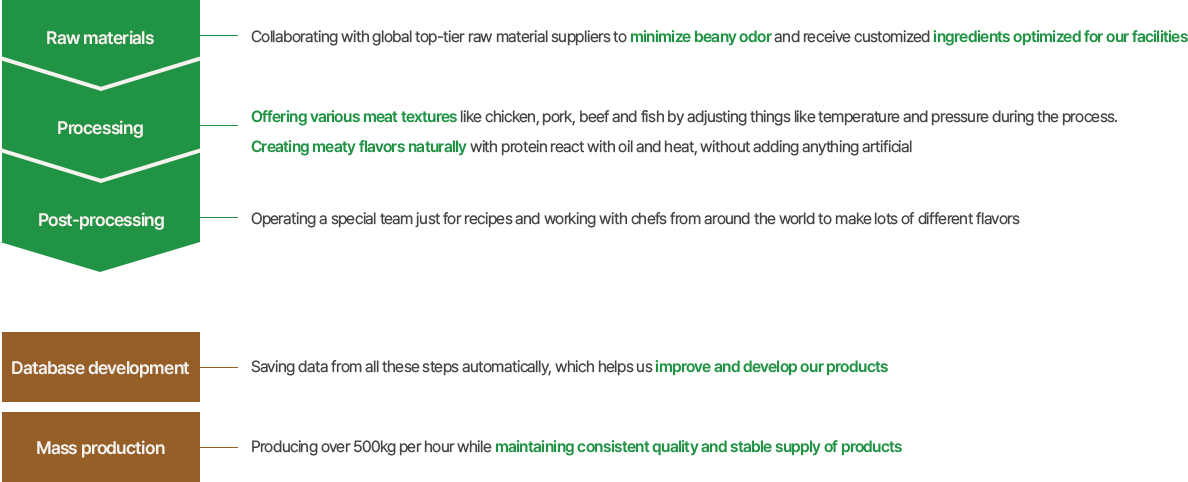Technology
Technology
-
Q.What is the HMMA?A.
HMMA(High Moisture Meat Analogue) refers to a high-moisture alternative meat production technology with a moisture content of 65% or more
Differences between LMMA TVP and HMMA TVP
within the tissue. Unlike LMMA(Low Moisture Meat Analogue) currently available in the market, HMMA boasts rich internal moisture,
offering a texture very similar to meat.*TVP : Textured Vegetable Protein, is a plant-based protein ingredient made by processing vegetable proteins.Differences between LMMA TVP and HMMA TVP ITEMS LMMA * TVP HMMA TVP Moisture content Dry-textured plant-based protein(6~25%)
Multi-stage extrusion(less 40%)Wet-textured plant-based protein(65%~) Texture Rubbery and firm texture, Hardens when cooled Chewy and moisture texture, Similar to real meat * Beany odor Some improvement, but still strong odor Significantly improved Sodium High sodium content for moisture adjustment and odor control Minimal sodium content for flavor Raw Materials Artificial additives are used Natural ingredients are used Applications Primarily on ground meat, With limited expansion Various meat type expansion possible
Including ground/seasoned meat and jerky
*Beany odor : It’s known by different names, such as the distinctive smell of soybeans.
-
Existing TVP
-
SUJISLINK TVP
-
Existing TVP
-
SUJISLINK TVP
-
Q.What is the current state of domestic companies producing LMMA TVP and HMMA TVP?A.
Previously, Korea did not have any TVP producers, so the country primarily relied on imports from countries such as Taiwan.
Only a few small and medium-sized enterprises produced soy protein domestically.
Today, some large companies and startups are focusing on the mass production and distribution of LMMA TVP they have developed.
Although a more advanced type of TVP, referred to as HMMA TVP, has been introduced in Korea, SUJISLINK is the only company
capable of producing a wide range of products and successfully industrializing with soybean protein that has improved flavor.
-
Q.What are the unique technological strengths of SUJISLINK?A.
SUJISLINK uses specialized technology to adjust each step of the production process, offering HMMA products that align with customer preferences.

-
Q.What are the plans for product development in the future?A.
SUJISLINK focuses on creating a variety of meat analogues, beginning with low-fat chicken breast and expanding to include fish, beef, and the more challenging pork. The company also seeks to refine its K-FOOD products to suit the preferences of consumers in various countries for the global market. Additionally, the company is expanding into the care and medical food sector to address the needs of an aging population.

